Hunter Penalized: Hitting Heisman Contender

Table of Contents
Hunter Penalized: Hitting a Heisman Contender's Momentum
The college football world was buzzing with excitement surrounding Hunter, a Heisman contender whose stellar performance had captivated fans and analysts alike. But that excitement took a sudden, jarring turn when a controversial penalty call significantly impacted his game and, potentially, his Heisman chances. This article delves into the incident, analyzing its implications and exploring the broader discussion surrounding officiating in college football.
The Controversial Penalty: A Turning Point in the Game
The game was a nail-biter, a back-and-forth battle between two top-ranked teams. Hunter, the star quarterback, was having a phenomenal game, showcasing his exceptional arm strength and elusiveness. Then, with the game hanging in the balance, the controversial call came. A late hit, deemed targeting by the officials, resulted in a 15-yard penalty and Hunter's ejection from the game.
The replay showed a questionable call. While contact was made, the severity and intent seemed debatable. Many felt the penalty was overly harsh, arguing that it significantly altered the outcome of the game and unfairly impacted Hunter's performance statistics, potentially derailing his Heisman campaign. The immediate reaction was outrage from fans and commentators alike, with many questioning the consistency and accuracy of officiating in college football.
Social Media Explodes: #JusticeForHunter Trends
The penalty immediately sparked a firestorm on social media. #JusticeForHunter quickly became a trending topic, with fans expressing their frustration and disbelief. Many videos and GIFs circulated, dissecting the play from various angles and debating the validity of the call. The discussion extended beyond just the penalty itself; it sparked a wider conversation about the need for improved officiating standards and greater transparency in the decision-making process.
Impact on Hunter's Heisman Hopes: A Statistical Setback?
The ejection undoubtedly impacted Hunter's statistical performance for the game. While he had accumulated impressive numbers before the penalty, the loss of playing time significantly hampered his overall totals. This, in turn, could have a considerable impact on his Heisman Trophy chances. Heisman voters often weigh statistical performance heavily, and this setback could potentially hinder his standing among other top contenders. However, it's important to remember that the Heisman isn't solely about statistics; it's about overall impact and the "eye test." Many believe Hunter's earlier performance in the game and his overall season statistics will still be considered favorably.
The Larger Issue: Officiating in College Football
The controversy surrounding Hunter's penalty highlights a long-standing issue in college football: the inconsistency and sometimes questionable calls made by officials. This incident fuels the debate about the need for improved training, stricter guidelines, and perhaps even the introduction of instant replay for all controversial calls. The lack of transparency surrounding officiating decisions also frustrates fans, leading to a lack of trust and fueling discontent.
Calls for Reform: Improving Transparency and Consistency
Many are calling for significant reforms within the officiating system. Increased transparency in explaining calls, more consistent application of rules, and perhaps even the use of technology like video review for every questionable penalty could significantly improve the fairness and credibility of the game. The Hunter incident serves as a stark reminder of how a single call can dramatically impact a game, a player’s career, and the overall integrity of the sport.
Conclusion: The Debate Rages On
The Hunter penalty remains a controversial topic, sparking debate among players, coaches, fans, and analysts. While the immediate impact on Hunter's Heisman chances is uncertain, the incident highlights the crucial need for improvements in officiating consistency and transparency in college football. The discussion surrounding this incident will undoubtedly continue, pushing for necessary changes to enhance the integrity and fairness of the sport for players and fans alike. The future of officiating in college football might well depend on the outcome of this ongoing conversation.

Thank you for visiting our website wich cover about Hunter Penalized: Hitting Heisman Contender. We hope the information provided has been useful to you. Feel free to contact us if you have any questions or need further assistance. See you next time and dont miss to bookmark.
Featured Posts
-
Brolin And Dinklage Hilarious Duo
Nov 17, 2024
-
Mercer Vs Alabama Milroe Performance Prediction
Nov 17, 2024
-
Health Insurance Broker Cincinnati
Nov 17, 2024
-
Celebrating Jon Kennys Father Ted Legacy
Nov 17, 2024
-
Cobra Kai Season 6 Part 2 Kwons Fate
Nov 17, 2024